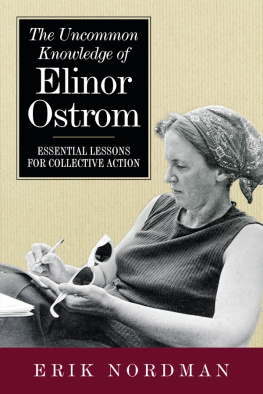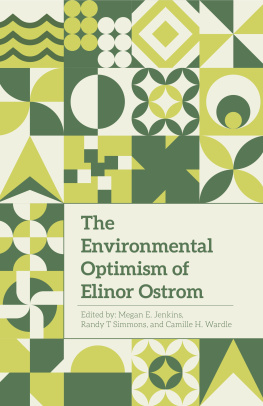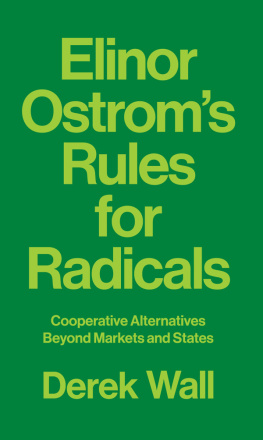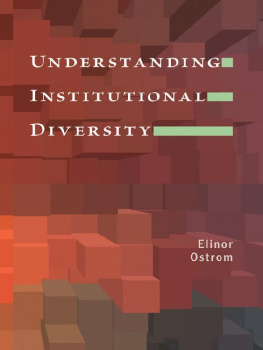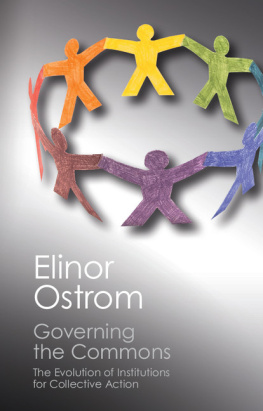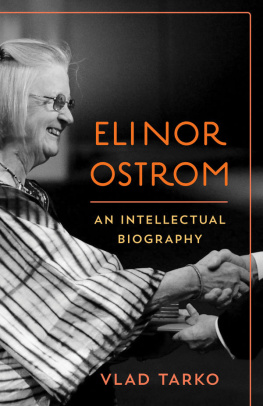Elinor Ostroms Rules for Radicals
Elinor Ostroms
Rules for Radicals
Cooperative Alternatives
Beyond Markets and States
Derek Wall
First published 2017 by Pluto Press
345 Archway Road, London N6 5AA
www.plutobooks.com
Copyright Derek Wall 2017
The right of Derek Wall to be identified as the author of this work has been asserted by him in accordance with the Copyright, Designs and Patents Act 1988.
British Library Cataloguing in Publication Data
A catalogue record for this book is available from the British Library
ISBN 978 0 7453 9936 2 Hardback
ISBN 978 0 7453 9935 5 Paperback
ISBN 978 1 7868 0122 7 PDF eBook
ISBN 978 1 7868 0124 1 Kindle eBook
ISBN 978 1 7868 0123 4 EPUB eBook
This book is printed on paper suitable for recycling and made from fully managed and sustained forest sources. Logging, pulping and manufacturing processes are expected to conform to the environmental standards of the country of origin.
Typeset by Stanford DTP Services, Northampton, England
Simultaneously printed in the United Kingdom and United States of America
Contents
To Estella Schmid
Acknowledgements
On the two occasions when I briefly met Elinor Ostrom, she was open, enthusiastic (despite her ill health) and answered my questions with patience. Her thoughts and actions continue to inspire me and give me hope. My wife Emily Blyth read every word of my text, made numerous suggestions and supported me in this project. The mistakes are all mine, the positive effects this text produces are the product of the practical labour of Elinor and Emily.
Of the many individuals who read drafts and made suggestions I would like in particular to thank Romayne Phoenix for her enthusiasm.
Political economy students in the Department of Politics, Goldsmiths College, University of London are familiar with Ostroms work, I must thank them for their keen interest and thank my colleague Paul Gunn for his enthusiastic inclusion of her work in his teaching. My 2016/17 cohort of New Radical Political Economy students were able to argue vigorously but respectfully with each other with opposing views on Marxist and Austrian economics, Elinor would have loved their passionate contestations and engagement with her work.
So many others made this project happen. David Castle was a patient editor. Anna Heyman also made useful suggestions to improve the book.
I was doing a bunch of research through the years that many people thought was very radical and people didnt like. As a person who does interdisciplinary work, I didnt fit anywhere. I was relieved that, after all these years of struggle, someone really thought it did add up. Thats very nice.
Elinor Ostrom,
interview with Fran Korten in 2010 (Korten 2010)
Rules for Radicals
1. Think about institutions
2. Pose social change as problem solving
3. Embrace diversity
4. Be specific
5. Listen to the people
6. Self-government is possible
7. Everything changes
8. Map power
9. Collective ownership can work
10. Human beings are part of nature too
11. All institutions are constructed, so can be constructed differently
12. No panaceas
13. Complexity does not mean chaos.
1
Elinor Ostroms Radical Life
[A] core goal of public policy should be to facilitate the development of institutions that bring out the best in humans.
(Ostrom and Ostrom 2014: 197)
Elinor Ostrom (19332012) was the first and, as I write, so far the only woman to win a Nobel Prize for economics. Strictly speaking there isnt a Nobel Prize for economics, but the Riksbank Prize in Economic Sciences in Memory of Alfred Nobel, which Ostrom shared with another institutional economist, Oliver Williamson. She won the award, according to the Nobel Committee for her analysis of economic governance, especially the commons, and is best known for her book Governing the Commons (1990). So, what is meant by the commons and why are they a subject of interest?
Commons are collective forms of ownership. In Britain, commons often take the form of land which is open to members of a community to graze livestock, fly kites or walk upon. An example that I am familiar with and often have the pleasure of visiting, because it is relatively local to me, is Cricklade North Meadow. North Meadow, near Swindon in the English county of Wiltshire, is one of the UKs most important wildlife sites. It is famous for beautiful flowers including the rare snakes head fritillary. The meadow has been maintained as a commons since before the Norman conquest of 1066. As it is the commons I am most familiar with it will be discussed as an example at various points in this text. Fisheries and forests may be commons, and the concept as a legal form has been extended to free software and the World Wide Web. The biologist Garrett Hardin wrote The Tragedy of the Commons in 1968, arguing that collective property was inevitably doomed to failure, because it would be abused by users (Hardin 1968). For example, too many cattle would be placed on the village green and it would be over grazed. The tragedy is that if no one individual privately owns a resource such as a field, people tend to exploit the good nature of others, fail to look after it and eventually it is wrecked. Or at least this is what Hardin argued. Yet increasingly, commons have been seen, on the left as a form of social collective ownership, perhaps even the basis for a communism (Hardt 2010).
Elinor Ostrom won the Nobel for demonstrating how local property can be successfully managed by local commons without any regulation by central authorities or privatization (Nobel.org 2009). She argued that commons, including common land, forests or fisheries that were owned collectively, could be conserved. This was radical stuff; other economists argued, along with Garrett Hardin, that collective ownership would always fail because of the tragedy of the commons which led to over use and disaster. However, she was not a leftist in a traditional sense and did not see commons as a straightforward alternative to private ownership in all circumstances.
According to Ostrom indigenous people and others have often maintained commons for hundreds or even thousands of years without destroying these environments. Ostrom argued that democratic control, rather than top-down management or simple privatisation, works to conserve nature. She can be seen as an ecological thinker, an advocate of cooperation and a subverter of economic notions of purely private ownership. This chapter provides a brief biography before discussing her potential contributions to radical political, economic and social transformation.
ELINOR OSTROM
Elinor was born in 1933 in Los Angeles, California, the daughter of Adrian and Leah Awan. Leah was originally a musician from South Dakota. Adrian was a set designer who worked for the Hollywood Bowl and Civic Light Opera, among other projects. Her parents divorced when she was a child. Her early years, shaped by divorce, the depression and the Second World War, seem to have instilled a frugality in her that is perhaps unusual for economists and might have contributed to her later passion for ecological living. She helped in the garden and with canning fruit produced by her mother. She felt that part of the solution to environmental problems would come with us consuming less and downsizing.


